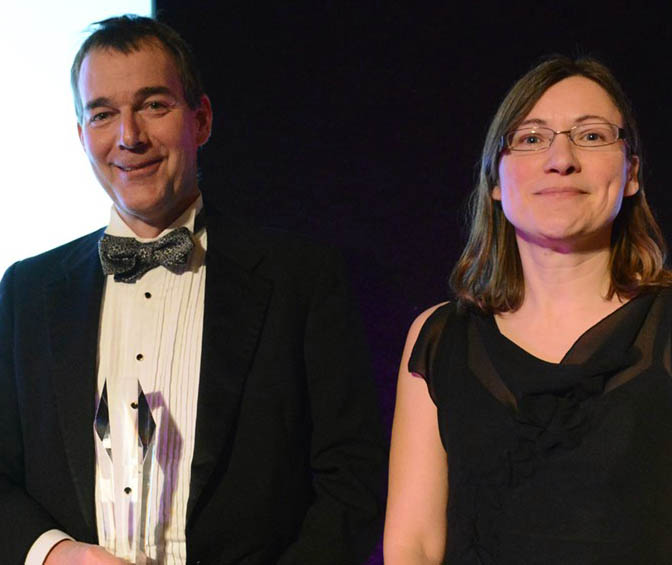Every year Business Weekly convenes the best and brightest of the Cambridge Cluster to recognise entrepreneurial success with its eponymous awards. This year we were pleased to sponsor two new prizes: the Cambridge Enterprise Academic Entrepreneur of the Year Award and the Cambridge Enterprise Lifetime Achievement Award.
At a gala dinner at Queens’ College on 21 March, chief executive Tony Raven presented the inaugural Lifetime Achievement Award to scientist, inventor and entrepreneur Sir Gregory Winter, Master of Trinity College. Winter is best known for his work on therapeutic antibodies at the Medical Research Council’s Laboratory of Molecular Biology in Cambridge. Humanised antibodies are invaluable for treating cancer and immune disorders, and now comprise many of the world’s top-selling pharmaceuticals, including Herceptin (for treatment of breast cancer) and Lucentis (to treat wet acute macular degeneration), as well as the human antibody Humira (to treat rheumatoid arthritis), currently the world’s top selling pharmaceutical drug.
In order to see his technologies applied, Sir Gregory founded several successful start-up companies, including Cambridge Antibody Technology in 1989 (acquired by AstraZeneca in 2006), Domantis in 2000 (acquired by GSK in 2006) and Bicycle Therapeutics in 2009, which is developing a peptide product for treatment of cancer.
The Cambridge Enterprise Academic Entrepreneur of the Year prize was awarded to the Professor Jim Huntington. In presenting the award, Anne Dobrée, Head of Seed Funds, said: “In the past year Jim was instrumental in reuniting the XO1 founding management team to launch SuperX with an $11 million Series A Funding with Medicxi and Johnson & Johnson Innovation to develop antibodies with anticoagulant properties. That was just seven days after he helped launch ApcinteX to target cures for haemophilia, raising around $18m in the process. The SuperX approach is based on observations from unusual case studies in patients. These experiments of nature have shone a light on the intricacies of blood coagulation pathways that have evaded conventional reductionist science for decades.”
In addition to the two new awards sponsored by Cambridge Enterprise, we were delighted to see portfolio company STORM Therapeutics win the Life Science Innovation Award, sponsored by AstraZeneca and its biologics division MedImmune.
Jane Osbourn of MedImmune, who introduced the award, said: “STORM is a University of Cambridge spin-out, translating the groundbreaking work of Professor Tony Kouzarides and Eric Miska in RNA epigenetics into the discovery of first-in-class drugs in oncology and other diseases.
“Leading the field of harnessing the power of RNA epigenetics as a new area of important biology, its ambition is to become a world leading therapeutics company tackling disease through modulating RNA modifying enzymes.
“Data validating the approach, published in Nature (Nov 2017) highlights the importance of RNA modifying enzymes in cancer, and in particular in leukaemia.”











